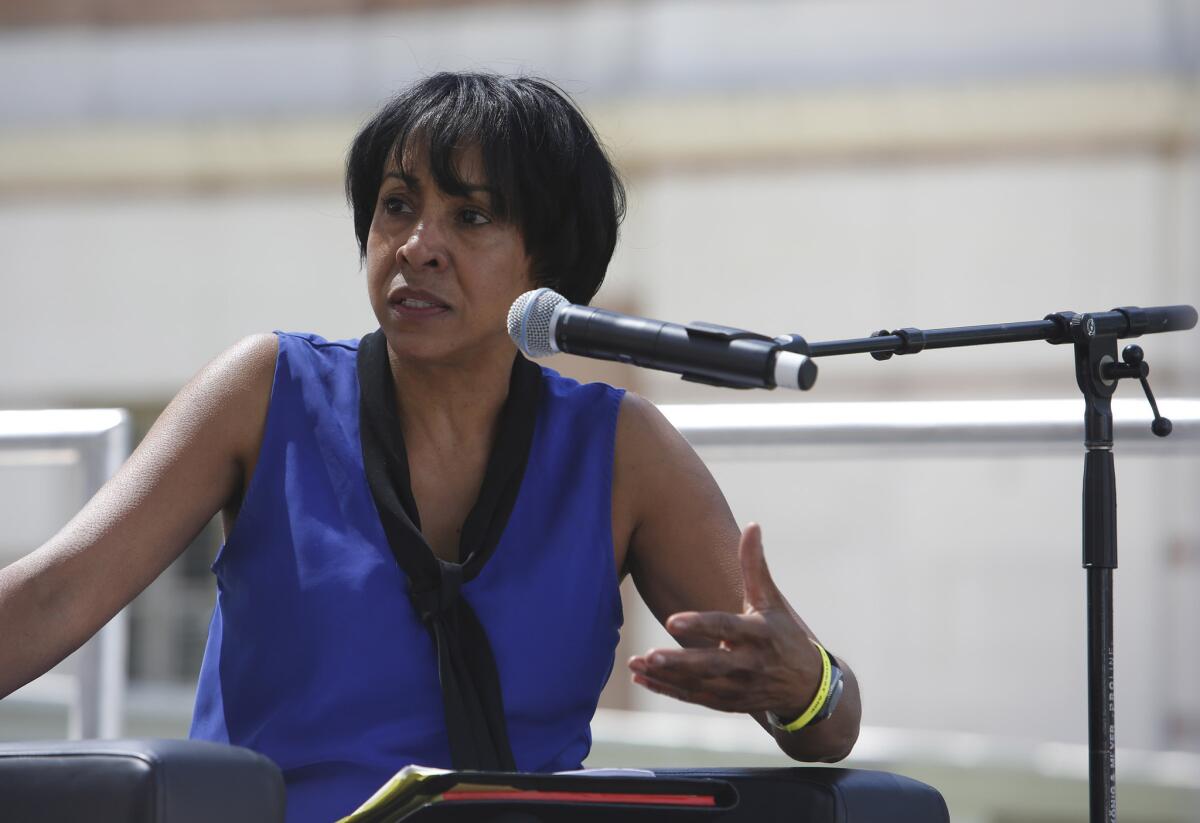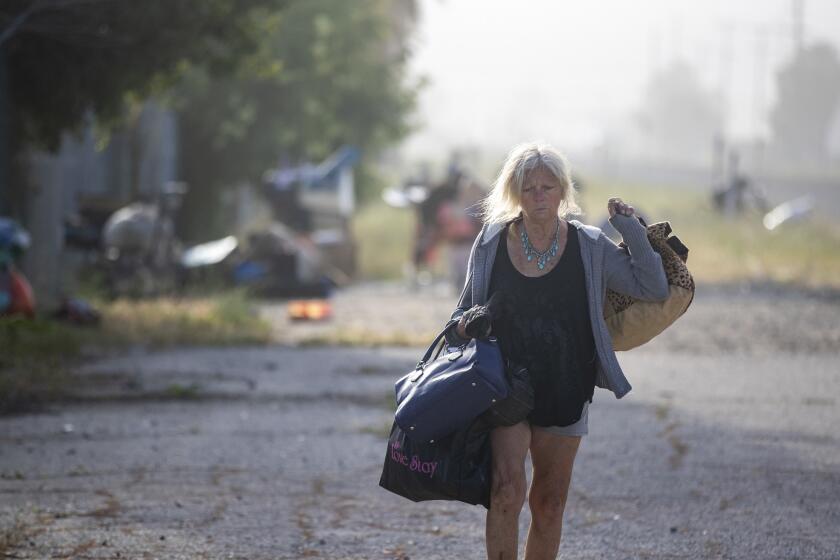Column: I left the L.A. Times in an era of change in the U.S. What am I returning to?

- Share via
For eight years, I had a front-row seat for the mayhem and miracles that make up Los Angeles. As an L.A. Times columnist, I roamed the region, from Laguna Hills to Lancaster, free to follow whatever stories interested me.
I figured if I was curious about something, readers might be too. That turned out to be true, whether the subject was as serious as our beleaguered foster care system or as inconsequential as my disappointment in the failure of my drought-starved vegetable garden.
Working the streets as a reporter constantly reminded me of all the ways we needed one another.
I learned how openhearted this city could be, and met people who changed the way I thought.
Like Mirna, a single mother whose Christmas dreams were dashed when a mugger stole all the money she’d squirreled away to shop for her three sons. Her toddlers could share a set of Hot Wheels cars. But her 12-year-old would go without the only thing he’d asked for: an iPod. He was the poor kid in a rich suburban school when the iPod was still the epitome of cool.
My holiday column, 10 years ago, about her plight prompted readers to shower her with money and gifts: iPods, clothing, gift cards, toys. She was grateful but stunned by the deluge and uncomfortable at being singled out when she saw so much need around her.
Chatsworth residents protest a planned building that would house homeless people. In the suburbs, sometimes “not in my backyard” involves backyards.
She wrote thank-you notes for every gift she received — then bought groceries for neighbors who were out of work, helped an ailing friend pay medical bills, delivered diapers to struggling mothers and doled out warm jackets to children waiting at cold bus stops.
Our connection carried lessons that would stick with me — not only about the generosity of readers, but also about the power of candor and compassion, the meaning of gratitude and sacrificial giving.
“There are so many people suffering,” Mirna told me. “They need to believe that somebody cares about them.”
That’s a motto that fits into my column blueprint. Journalism is a force that can introduce us to one another and soften the lines that tend to divide us. That’s an important role, with high stakes.
Yes, the deadlines are relentless, the paychecks will never make us rich, and the public doesn’t seem to love us anymore.
But I consider it a privilege to be a journalist — to capture life’s interplay of misery and joy, to build bonds with strangers who trust me with their stories, to explore ideas that expand minds and open hearts, including my own.
******
When I left the newsroom at the end of 2015, I thought being untethered from journalism would be liberating. For years, I’d spent every waking hour scanning the horizon for ideas. I relished the prospect of moving through life free of the responsibility to analyze everything.
For the most part, I enjoyed my new deadline-free life. I taught a college class, learned video production, helped write and edit books. I enjoyed the luxury of time with my three daughters, who had grown up hearing, “Not now! I’m on deadline!” way too often. But sometimes things got weird. Accustomed to a platform for my every thought, I talked too much, asked too many questions or vented too intensely to anyone unlucky enough to make eye contact with me.
Over those four years, I was never able to shed the accoutrements of journalism. I couldn’t silence the voices in my head when I had a story to tell, or stifle the curiosity that had me chatting up strangers for columns I would never write.
So I’m back and eager to rejoin the public conversation, exploring the forces that shape our region, inform our policies and animate our private lives.
*******

A sea change swept the country while I was gone. I left in the era of hope and change; I’m returning now to Sturm und Drang.
Norms have morphed so dramatically that language that would have shocked me four years ago now seems mundane. Symbols that once seemed clear are being reframed by ugly rhetoric and hateful claims.
On walks through the Northridge neighborhood I’ve lived in for 33 years, I see American flags hanging from homes that never displayed them before — or maybe I am only just noticing them.
Now they trigger something uncomfortable in me, as I sort through the checklist in my mind of all the display might mean.
The concept of patriotism has been muddied by politics and sullied for me by white supremacists waving the American flag at hate-mongering rallies, where anyone who doesn’t fit their demographic is targeted with vile attacks.
I spend a lot of energy trying to hold off the ambient sort of anxiety that can warp the thinking of reasonable people, magnify the danger of ordinary things and cast strangers as enemies.
I see the fallout when I scroll through my local Nextdoor feed, where a routine report of a coyote sighting can trigger an online political brawl, and suggestions for dealing with the influx of homeless people have included pelting them with eggs.
I don’t want to believe that my neighbors could be that mean, but it does feel like something toxic has been unleashed across the country.
Moving through that cloud and into fresh air requires that we work together to address our challenges. The issues we’re dealing with won’t be simple to resolve: homelessness, housing, struggling schools, a transportation system stuck on stall.
But I believe we can address those problems without violating our principles. For starters, let’s stop shouting from the sidelines, listen to one another and look for ways to get involved.
More to Read
Sign up for Essential California
The most important California stories and recommendations in your inbox every morning.
You may occasionally receive promotional content from the Los Angeles Times.












